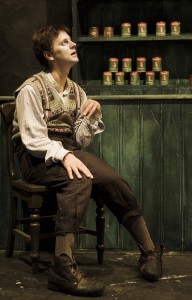UMS Arts Roundup: December 15
Many members of the UMS staff keep a watchful eye on local and national media for news about artists on our season, pressing arts issues, and more. Each week, we pull together a list of interesting stories and share them with you. Welcome to UMS’s Arts Round-up, a weekly collection of arts news, including national issues, artist updates, local shout-outs, and a link or two just for fun. If you come across something interesting in your own reading, please feel free to share!
Arts Issues
- Michael Phelps won’t be the only one to watch in London at the 2012 Summer Olympic Games – the Cultural Olympiad London 2012 festival will coincide with the games, bringing the world’s best artists and the world’s greatest athletes to one city.
- Creative leaders in Africa speak up about obstacles they face in acquiring federal funding and maintaining ethical standards in the arts industry on their continent.
Artist Updates
- Renée Fleming has accepted a position as the new Creative Consultant for the Lyric Opera of Chicago — but that doesn’t mean she’ll stop singing. Quite the contrary.
UMS News
- Planning to see The Cripple of Inishmaan this March? Check out the newest casting information for their tour, set to begin next month!
- What about Propeller’s Richard III — also in March? In The British Theatre Guide review of the production, Sheila Connor writes, “This inventive company brings the most thrilling, and the most wayward, production you are ever likely to see – truly mesmerizing.”
Local Shout-Outs
- President Barack Obama nominated former UMS board member and friend Aaron Dworkin, President of the Sphinx Organization in Detroit, to the National Council on the Arts.
Just For Fun
- 109,901 may set the attendance record for hockey, but the record is a bit higher for live performance – 3.5 million, to be exact. Only two performers have ever done it: Rod Stewart in Rio de Janeiro and Jean-Michel Jarre in Moscow.


- With 2010 coming to a close, NPR’s Susan Stamberg catalogues some of the Best Books of 2010…
- While Mark Juddery discusses the 10 Works of Literature that were “really hard to write.”
- Does Messiah give you the chills? That may be a clue to your personality…
UMS Staff Picks: The Cripple of Inishmaan selected by Sara Billmann, Director of Marketing & Communications
SN: The multi-award winning Druid and Atlantic Theater co-production of Martin McDonagh’s The Cripple of Inishmaan has been described as “a break-your-heart, cruelly funny evening” – what kind of theatrical journey can audience members expect to experience when they see this production?
SB: I don’t want to spoil the story, but suffice it to say that it will be quite an emotional ride.
I’ve seen two of Martin McDonagh’s plays when they were produced in New York in the mid-late 1990s, and they are simply brilliant pieces, in part because of the way they force you to re-examine your own morals. He sets up these outrageous scenes that are absolutely hilarious, then delivers the knock-out punch that makes you realize you’ve been laughing at something that is, in fact, incredibly tragic. The June issue of <i>Opera News</i> put it perfectly: “As anyone who’s ever sat through a Martin McDonagh play can attest, sometimes the only response we can muster when confronted with the searing emotional or physical pain of others is a laugh.”
I read this play poolside while visiting my in-laws in San Antonio and found myself laughing out loud on any number of occasions. Let’s face it, there are many plays where you chuckle inwardly, but something that produces a spontaneous outburst while reading to yourself is extraordinary in its own sense. And based on every production I’ve seen of McDonagh’s work, the live production will far exceed what’s on the page.
So that we could all familiarize ourselves with the play, about a dozen members of the UMS staff did a “read-through” this summer. I hope that some audience members will be interested in doing the same — we’d be interested in putting together play-reading groups for others and loaning the scripts. It’s a great way to familiarize yourself with the dialects and turns of language that really bring the piece alive. And, of course, a great way to meet new people too.
SN: What are you most looking forward to about this UMS debut performance?
SB: It’s pretty simple, really – I just can’t wait to see what they do with the production to bring it alive. I have friends who saw this production when it was on Broadway a few years ago and raved about it. Having grown up in a small town, I recognize some of the quirky characters and look forward to seeing how they are realized on stage.
SN: What other events are on your “must see” list for the 10/11 season?
SB: Just about everything! As a trained classical musician, I’m particularly interested in the big orchestras and piano recitals. I was turned on to Denis Matsuev about two years ago by someone who had heard his recording in Gramophone magazine. His playing is really quite extraordinary. I also adore Schubert and am looking forward to the three Tákacs concerts, as well as the Scharoun Ensemble performance of the Schubert Octet. I’m also looking forward to Grupo Corpo – what a great company! I could go on and on. The beauty of being the marketing director for UMS is that I start to research all of the artists we’re presenting long before we announce the season, and I always get turned on to things I never would have thought I’d enjoy…which ultimately means that the entire season becomes a “must see” for me.
SN: What do you enjoy doing outside of work?
SB: I have two kids – Elisabeth is 8 and going into 4th grade, and Harry is 6 and going into 1st grade – who keep me plenty busy. I was about to respond that I do laundry outside of work, until I saw the word “enjoy” in the question. Elisabeth loves to play baseball, so I think I’ve spent the better part of July attending her games and taking her to see the Tigers when time permits. I’m also hopelessly addicted to The New Yorker and steal moments here and there to try to stay caught up. Other hobbies include wine tasting and walking the dog – we acquired a boxer/pointer mix from the Humane Society three months ago, and I’ve become the family’s designated dog walker, which fills up a shocking amount of time each day.
SN: What have you been listening to on your iPod?
SB: Ha! The day I get to listen to my iPod will be a great day indeed. Lately my kids have been torturing me, making me listen to “Stayin’ Alive” and 1980s dance tunes (oh, to return to the days when my daughter would watch “The Barber of Seville” by choice…). But when I can wrestle it away from them, I mostly listen to Schubert lieder, Maria Joao Pires performing Schubert and Chopin, Denis Matsuev playing Rachmaninoff, and Mahler, though truth be told, the iPod doesn’t do Mahler justice. Murray Perahia‘s recital in 2000 of the Bach/Busoni Chorale Preludes and the Goldberg Variations will always rank among my top UMS performances, and I often bring back that memory with the recording “Songs Without Words” released around the same time. Angelika Kirchschlager and Fritz Wunderlich are among my favorite singers, though I will confess that I also enjoy Pink Martini in my less serious moments. And I recently loaded on a CD by a wonderful Iranian group called Ghazal.
An interview with Michael Kondziolka, UMS Director of Programming
 UMS Programming Director Michael Kondziolka is a man brimming with enthusiasm for the performing arts, and that enthusiasm is infectious. Once you start a conversation with him about UMS performances, or about the history of UMS, or about the UMS Advisory Committee – a subject he knows more about than most AC members (more about that below) – you don’t want to stop!
UMS Programming Director Michael Kondziolka is a man brimming with enthusiasm for the performing arts, and that enthusiasm is infectious. Once you start a conversation with him about UMS performances, or about the history of UMS, or about the UMS Advisory Committee – a subject he knows more about than most AC members (more about that below) – you don’t want to stop!
But before I dive into the pleasures of our conversation, let me mention the pronunciation of Michael’s last name, so it sounds right in your mind as you read this. In Polish, dz sounds like j in the word judge or joke. The rest of the pronunciation is straightforward. So: Kon-jolk’-a (The i in dzio just happens. Try saying his name without it. You can’t.)
Since my enthusiasm is theater, we started our discussion with that – the excitement we both feel about the companies coming next season: Druid Theatre, based in Galway, Ireland; and Propeller Theatre, based in West Berkshire, England. Druid will bring one of Martin McDonagh’s famous darkly comic plays about life on the Aran Islands, The Cripple of Inishmaan. (If you don’t know anything about McDonagh, here’s an inducement to find out more: according to the Internet Movie Database, McDonagh is the first playwright to have four plays running simultaneously in London since Shakespeare.) The Druid Theatre has premiered all of McDonagh’s plays, which include the smash hit, The Beauty Queen of Leenane.
Propeller will bring its unique take on Shakespeare with productions of Shakespeare’s Richard III (itself darkly comic at times) and The Comedy of Errors. Michael reminded me that UMS has presented theater for only about a decade. We reminisced about Dublin’s Gate Theatre’s two Beckett plays during the 2000-01 season: the marvelous David Kelly (from Waking Ned Devine) performing in Krapp’s Last Tape; and the revelatory quality of the Gate’s Waiting for Godot, which blended in perfect proportions Beckett’s hallmark mix of comedy, pathos, and absurdity. Both plays brought out the vaudeville-type humor Beckett is known for (Krapp’s Last Tape memorably features a pratfall with a banana peel).
Then two years later, the Gate brought Fiona Shaw in its shattering production of Euripides’ Medea. Familiar to all of us are the capstone theater experiences of the past decade: the three Royal Shakespeare Company residencies, which engaged audiences, students, educators, and the general southeast Michigan communities through public talks, exhibits, the Sonnet Slam, and so much more.
This expansion of UMS’s range of programming into theater followed a similar expansion in the 1990s, into dance. Michael recounted the time someone asked him what dance events UMS had presented in the 1950s – a question easily answered: None! In the 80s and earlier, UMS was still presenting only music, largely classical. And the programs received at performances? A folded 8½ X 11” sheet of paper. The expansion into more kinds of programming and education, plus expanding the funds available to support those efforts, has formed a core part of Michael’s professional work for UMS.
The reason he knew doing this kind of work for UMS was what he really wanted to do is that he had already been a work-study intern at UMS for a year, while finishing a graduate fellowship in clarinet performance at the U-M School of Music, Theater & Dance. In fact, during his internship, he met every day with Advisory Committee members. He helped stuff envelopes, develop mailing lists, and other tasks associated with AC’s early fundraising efforts, which were focused mostly on the first night dinners before the annual May Festival, and on Encore, the early name for UMS’s annual donor fund program. At that time, fundraising for the ever-increasing costs of bringing outstanding performers to Ann Arbor was undertaken in a social rather than a business context. Advertising and corporate sponsorship were deemed slightly unseemly.
That began to change in 1988, through Michael’s and Ken Fischer’s efforts. Before arriving in Ann Arbor to pursue his musical studies (he has a liberal arts degree from St. Olaf College in Northfield, Minnesota), Michael spent a year as the operations manager for a subsidiary of Merrill Lynch in Minneapolis. He came from a family of successful business men and women, who were mystified by his interest in being a musician. When he came to the realization that bringing artists to the stage, rather than performing on stage, was his passion, he stopped classes and began working for UMS in marketing, production, group sales, and educational outreach.
The first educational programs were for adults and university students, and were also early collaborative projects with other parts of the university. One example is the symposium which was part of the Michigan Mozart Festival in 1989. Another early collaborative project, the American Contemporary Dance Festival, was followed by Shostakovich: The Man and His Age; In the American Grain: The Martha Graham Centenary Festival (both 1994); and the Cleveland Orchestra Residency (1995). In addition, Michael developed and implemented, with Ken Fischer, the first youth education performances, which were produced in conjunction with the New York City Opera.
After four years helping to develop these new and varied avenues of performance, education, and collaborative productions, Michael was ready to move on to New York and apply his skills there. But when he was offered the position of Artistic Administrator, he happily cancelled plans to move. That position, which developed into his current position of Director of Programming and Production, offered a perfect marriage of his business skills with his love for bringing great performances to the stage. He has been here ever since, and UMS programs have been the better for it!
Click here for a fascinating interview with Michael conducted by Living Music, put out by the U-M School of Music, Theater & Dance and the American Music Institute.




